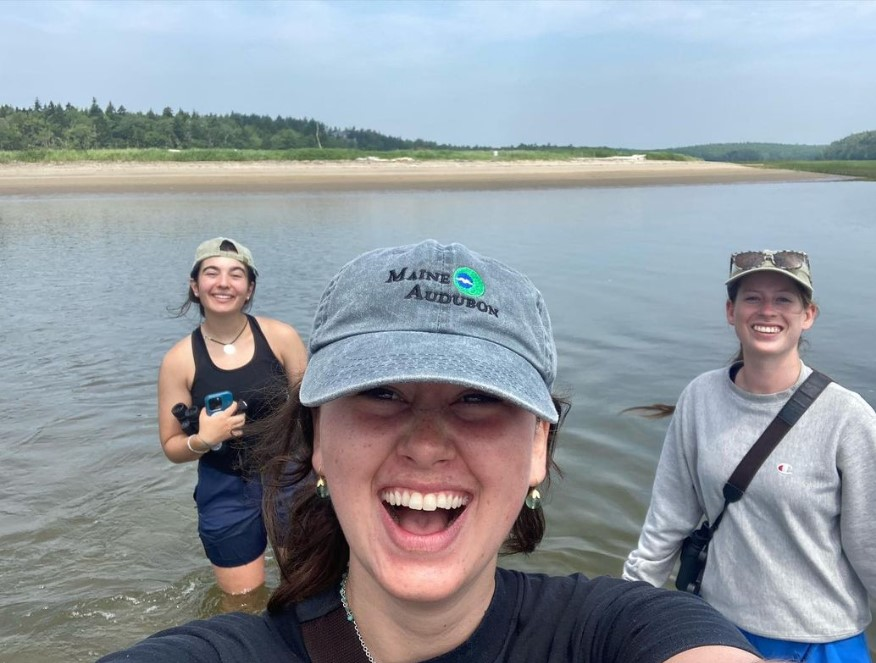
The Coastal Birds project hires seasonal biologists, technicians, and interns every summer to help with Piping Plover and Least Tern conservation on the beaches from York to Georgetown. Every summer, we are fortunate to have energetic students who are willing to do whatever it takes! Here, they share some thoughts about what their experiences were like this past summer. We wish them well wherever their next adventure takes them.
(Above photo: Interns crossing from Half Mile Beach to monitor a nesting pair on Indian Point in Georgetown. Left to right: Mia Khavari, Norah Adler, Nicole Snow)
“I remember the pure excitement I felt when I received a call telling me I was chosen to be an intern for the 2023 Coastal Birds Crew. Even though I have been studying marine biology for the past two years and I have been mainly focusing on small marine invertebrates, I wanted to take a glimpse into the world of shorebirds—especially the endangered Piping Plovers. I have always been interested in the health of our oceans and the conservation of endangered marine organisms, but only recently became more interested in the animals on the shore. My first day with the crew was hectic, but fun.
I was taught how to nest search, to recognize the difference between tern and plover eggs, and to determine different predatory tracks all in the first few hours of the day. As the summer went on, I learned to spot chicks, which became my favorite part of every day. At the end of the season, it was eye-opening to see the amount of chicks fledged and the number of pairs that came back to mate this season. This summer was hard work, but it’s an amazing feeling to know that I have helped to conserve the plover population. I’ve made great friends, gained valuable field experience, and learned conservation skills that will be important for my future endeavors. Above all, I have gained lifelong knowledge and respect for the Piping Plovers.”
—Nicole Snow, Maine Maritime
“This summer, as I first walked into the Falmouth [Maine Audubon] office, it didn’t dawn on me that I knew absolutely nothing about birds. I had somehow been hired to monitor the beaches of southern Maine, researching Piping Plovers and Least Terns. But by the end of my internship, I would be able to spot a camouflaged plover egg in seconds, experience the wonders of Old Orchard Beach on the 4th of July, and understand a little more of the Maine culture (like that Route 295 is actually called 295 by true Mainers).
The first thing that struck me was the dedication, sacrifice, and joy that the Maine Audubon team has for the work they do. I was instantly welcomed by a team of five people all dedicating their lives to protecting birds. I admired how welcoming they were to me, but I also admired their passion and drive. Besides the manual labor that goes into field work, every biologist tries their best to be a good team member and support one another. Each day, they would all come in with the purpose of not just completing the job but excelling. Working for Maine Audubon was amazing in many ways, but I really loved working for such a close knit, interesting team. I am so glad I was able to spend my summer with Maine Audubon. I am more curious about the natural world, and I can now return to those same beaches during the school year, and feel connected to the land. I can’t wait to start micromanaging my friends on their beach-going habits next summer when the plovers and terns return!”
—Norah Adler, Colby College
“Growing up along the southern coast of Maine, I had always admired the breeding migratory birds of all varieties, including our dearest Piping Plovers and Least Terns. Initially, when I applied for this internship, I imagined it would be about using biology techniques. But ultimately, I found creating a dialogue with beach community members around the importance of our work the most important and satisfying. Learning the levels of policy needed, from local beach agreements to state policy, up to the federal level, demonstrated how tirelessly this incredible team works for our endangered species. I was equally amazed and inspired by the powerful team of volunteer bird monitors that are out on the beach and ready to chat about all the latest beach news. Coming to understand the human political and social power that surrounds our lovable birds has not only given me a deeper appreciation for field science but also for the people that help communicate and grow our ability to research and protect these feathery friends!”
—Mia Khavari, Northeastern
